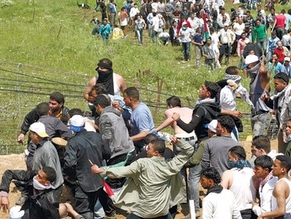|
World Jewish News

Palestinians streaming over the border at Majdal Shams. Photo by: Yaron Kaminsky (Haaretz.com)
|
UN: Israel used unnecessary force against protesters on Nakba Day
06.07.2011, Israel A new report of United Nations Secretary General Ban Ki-moon is highly critical of Israel for its handling of incidents on the border with Lebanon on May 15 - Nakba Day. It concludes that the Israeli soldiers used disproportionate force against Lebanese demonstrators, which resulted in seven deaths.
In Israel there is great anger at the UN special coordinator for Lebanon, Michael Williams, who authored the report, and the Foreign Affairs Ministry is cutting contact with him until further notice.
The secretary general's report, which deals with the implementation of UN Security Council Resolution 1701 (ending the Second Lebanon War ), was disseminated several days ago to members of the Security Council, and Haaretz received a copy.
The report mainly deals with the Nakba Day incidents.
In its conclusions the secretary general expresses concern about Nakba Day and notes that IDF soldiers "used direct live fire against unarmed demonstrators" who tried to breach the border fence. He called on the Lebanese Army and the IDF to avoid such incidents from recurring.
"I call on the Israel Defense Forces to refrain from responding with live fire in such situations, except where clearly required in immediate self-defense. Notwithstanding every country's inherent right of self defense, there is a need for the Israel Defense Forces always to apply appropriate operational measures, including crowd control measures, which are commensurate to the imminent threat toward their troops and civilians," the report states.
The report notes that some 8,000-10,000 demonstrators participated in the Nakba Day demonstrations in Lebanon, most of them Palestinian refugees. "Organizers included Palestinian and Lebanese organizations, among them Hebollah," the report said.
About 1,000 protesters broke off from the main demonstration, which took place without disorder, and moved toward the border fence with Israel, throwing stones and firebombs, and removing 23 anti-tank mines, the report notes.
"Following a verbal warning and firing into the air, the Israel Defense Forces then directed live fire at the protesters at the fence," according to the report, "killing seven civilians and injuring 111."
The report is based on the investigation findings of UNIFIL, which note that it was the Palestinian demonstrators who initiated the trouble, were first to use violence, and violated UN Security Council Resolution 1701. However, the majority of the report's criticism is directed at the IDF.
"Other than firing initial warning shots, the Israel Defense Forces did not use conventional crowd control methods or any other method than lethal weapons against the demonstrators," the report states.
Moreover, the UN report notes that "the firing of live ammunition by the Israel Defense Forces across the Blue Line [the border fence] against the demonstrators, which resulted in the loss of civilian life and a significant number of casualties, constituted a violation of resolution 1701 (2006 ) and was not commensurate to the threat to Israeli soldiers."
At the Ministry of Foreign Affairs, and at the IDF Planning Directorate which is responsible for dealing with Lebanon, they had expected a particularly critical report, especially because of the tension between Israel and the UN coordinator Michael Williams, who prepared the report on behalf of Secretary General Ban Ki-moon.
Hours after the Nakba Day incidents, Williams assailed Israel and blamed it for the incidents, without condemning the attempt to breach the border fence from the Lebanese side. Foreign Minister Avigdor Lieberman was furious with the comments Williams made and instructed the Israeli delegation to the United Nations to contact the secretary general's office and complain about the coordinator for Lebanon. Similar demarches were made to the ambassadors of France, Italy and Spain at the UN, as they are the three countries contributing most of the troops to UNIFIL.
To send an even stronger message to Williams, the Foreign Ministry decided to cancel his periodic visit to Israel, which was due in a number of weeks. Williams asked to hear Israel's position on the events of Nakba Day, but he was told that there was no time to meet with him, and that Israel would relay its views directly to the secretary general's office.
Foreign Ministry sources said that it remains unclear whether Israel will resume contact with Williams.
By Barak Ravid
Haaretz.com
|
|
